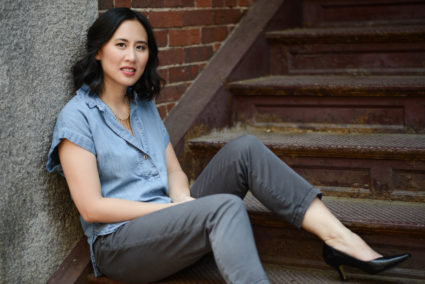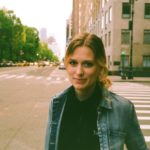
How reading 'The Woman Warrior' put Celeste Ng's feelings into words
Our August pick for the PBS NewsHour-New York Times book club, "Now Read This" is Maxine Hong Kingston's 1976 memoir "The Woman Warrior," which was chosen by author Celeste Ng. Become a member of the book club by joining our Facebook group, or by signing up to our newsletter. Learn more about the book club here.
Celeste Ng, the best-selling author of "Little Fires Everywhere" and "Everything I Never Told You," says some of the best advice she's ever received is to go outside her comfort zone. In reading, in writing, and in life. A friend of hers likes to say that you can always tell when you're about to learn something, because you'll start to feel uncomfortable. "That's pretty good advice for both writing and life," Ng said.
Ng, who chose this month's book club pick, the 1976 classic memoir "The Woman Warrior," felt uncomfortable the first time she read the book as a teen. "It was so close to my experience, it was almost painful," she said. "But it was a kind of painful that felt cathartic: It put into words so many things that I hadn't been able to articulate even to myself."
Read more from Ng, including the one thing she thinks everyone should read (more poetry!), her writing routine (which sometimes includes long walks), and books that were formative to her as a child (hint: they take place in the land of Oz).
What is your daily writing routine?
I have a young son at home, so schedule-wise, my routine revolves around his school day. In the morning, my husband drops him off at school, and I go up to my office in our house and write for a few hours. Then I do some email and whatever other work I have — interviews, reading books for blurbs, and so on — before I go to school for pickup. After that, I'm basically done with writing work for the day, though of course I'm always reading for pleasure when I can.
In terms of what I actually do when I'm writing: I usually start by reading over what I did the day before. I'll get an idea for how to continue, or I'll be horrified by what I have and start fixing things up — either way, that gets my mind back into the project. However, I've learned that writing includes more than just putting words on the page. I do a lot of stuff that probably doesn't look like writing to an observer. Sometimes it's reading, either for research or inspiration. Sometimes it's going for a long walk, or doing something with my hands — crocheting, knitting, painting: those things let my brain relax and think in an unstructured way, which is also part of the writing process. I often end up working out character details or plot points that way.
What is your favorite childhood book?
I still have an entire bookshelf of books from my childhood, so it's hard to pick just one! But I read the "Wizard of Oz" series, by L. Frank Baum, dozens of times, and they were probably a formative influence on me as a writer. Every book begins with someone being spirited out of the "regular" world into Oz, which is populated with fantastical people and animals and creatures. It's a fairly literal representation of the way books can whisk you into entirely new worlds, and of fiction's power to create things that are totally imaginary but completely imaginable.
And, as I realized later, the Oz books often contain tongue-in-cheek commentary on the political and social happenings of Baum's time — which reminds me that every book, no matter how fantastical it seems, has its roots in our world, and reflects something about the culture we live in, whether we intend it to or not.
What is something you've seen, watched or read that you think is overlooked and deserves more attention?
Can I be super broad here, and say — poetry? In our culture we tend to prioritize narrative (and as a fiction writer, I'm indicting myself here, too). We focus on what happens next, on clear causality, on tidying experience into a clean neat arc–possibly with a moral at the end. That has tremendous value, but there's also huge value in resisting that impulse toward linearity. Poetry allows space for that, and in doing so, it opens us up to other ways of thinking in ways that more narrative writing often can't.
Lately I've been reading more poems, both older writers whose work I'm revisiting — like Adrienne Rich and Keats and Plath and, frankly, Shakespeare — as well as newer poets whose voices I'm just discovering: Ada Limón, Ross Gay, Adrian Matejka, Sally Wen Mao, Aimee Nezhukumatathil, Ocean Vuong. Many poets write from the margins in one way or another, and that sometimes allows them to speak about things that often go unnoticed or unsaid. Viewing the world through their eyes can inflect the way we see the world, for the better.
What is the best piece of writer's advice you've received?
Challenge yourself. Go outside your comfort zone — in what you read, in what you write — whether it's a little or a lot. It's how you grow as an artist and as a human being. A friend of mine likes to say, "I can tell when I'm about to learn something, because I start feeling very uncomfortable," and I think that's pretty good advice for both writing and life.
When did you first encounter "The Woman Warrior"? What made you choose it?
We had a copy of "The Woman Warrior" on our bookshelf at home — if there's a book by a Chinese-American woman, my mother probably has it. At some point in my adolescence I took it down at random and read it, and it was so close to my experience, it was almost painful. But it was a kind of painful that felt cathartic: It put into words so many things that I hadn't been able to articulate even to myself. To be able to state those feelings clearly and precisely is a kind of power.
When I got older, it came up again and again in my classes — often, it was the sole representation of Asian Americans on the syllabus. It's hard to emphasize how significant the book is; it is impossible to talk about Asian American literature — arguably, about American literature, period — without discussing it. And while I'm glad there are more books by and about Asian American women being read now, "The Woman Warrior" is also a classic for a reason. Despite being over 40 years old, it still feels groundbreaking in its themes, its form, and its intensity. And in an era when we're wrestling anew with questions of who gets to belong, it remains incredibly relevant for all readers.
Support Canvas
Sustain our coverage of culture, arts and literature.



















